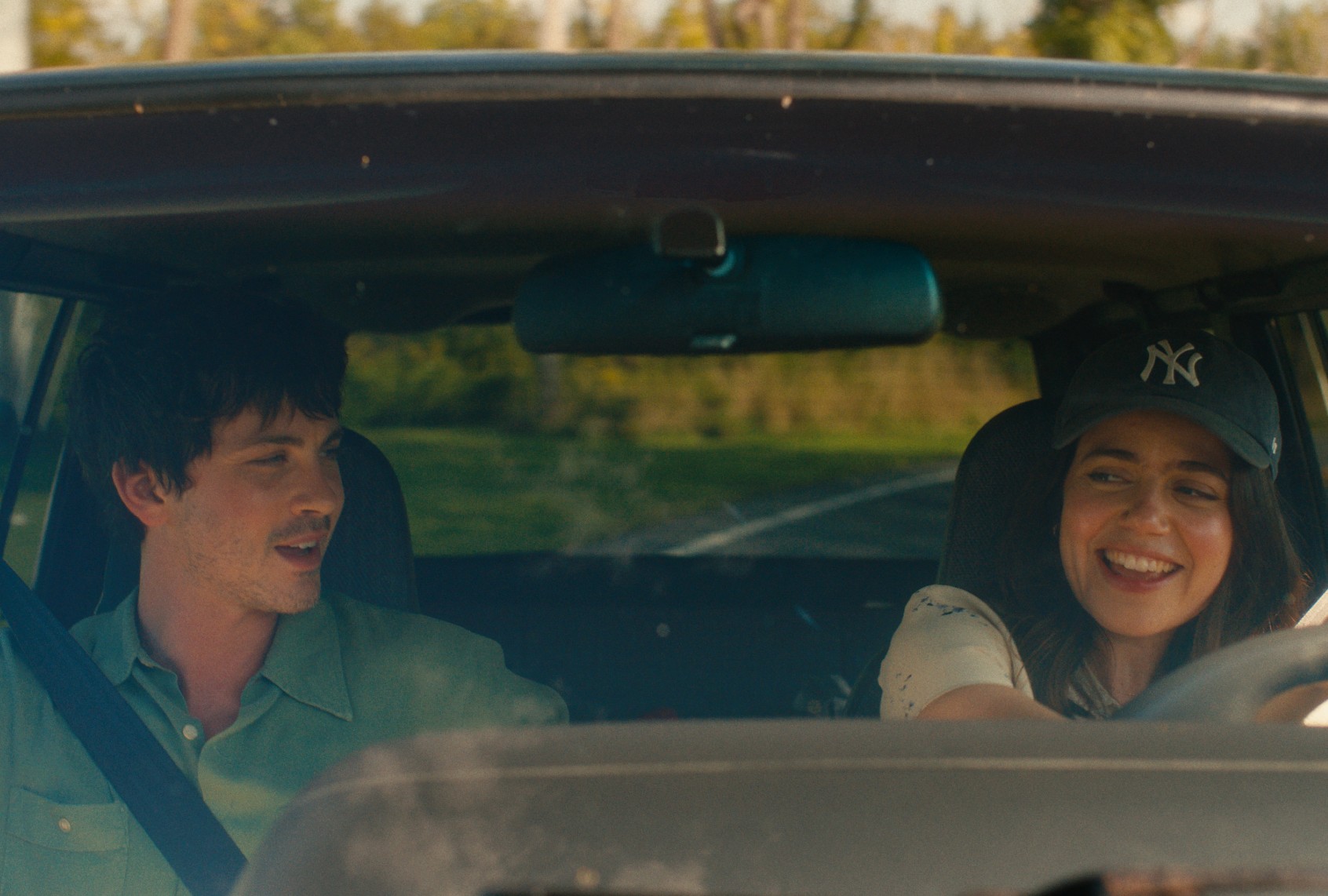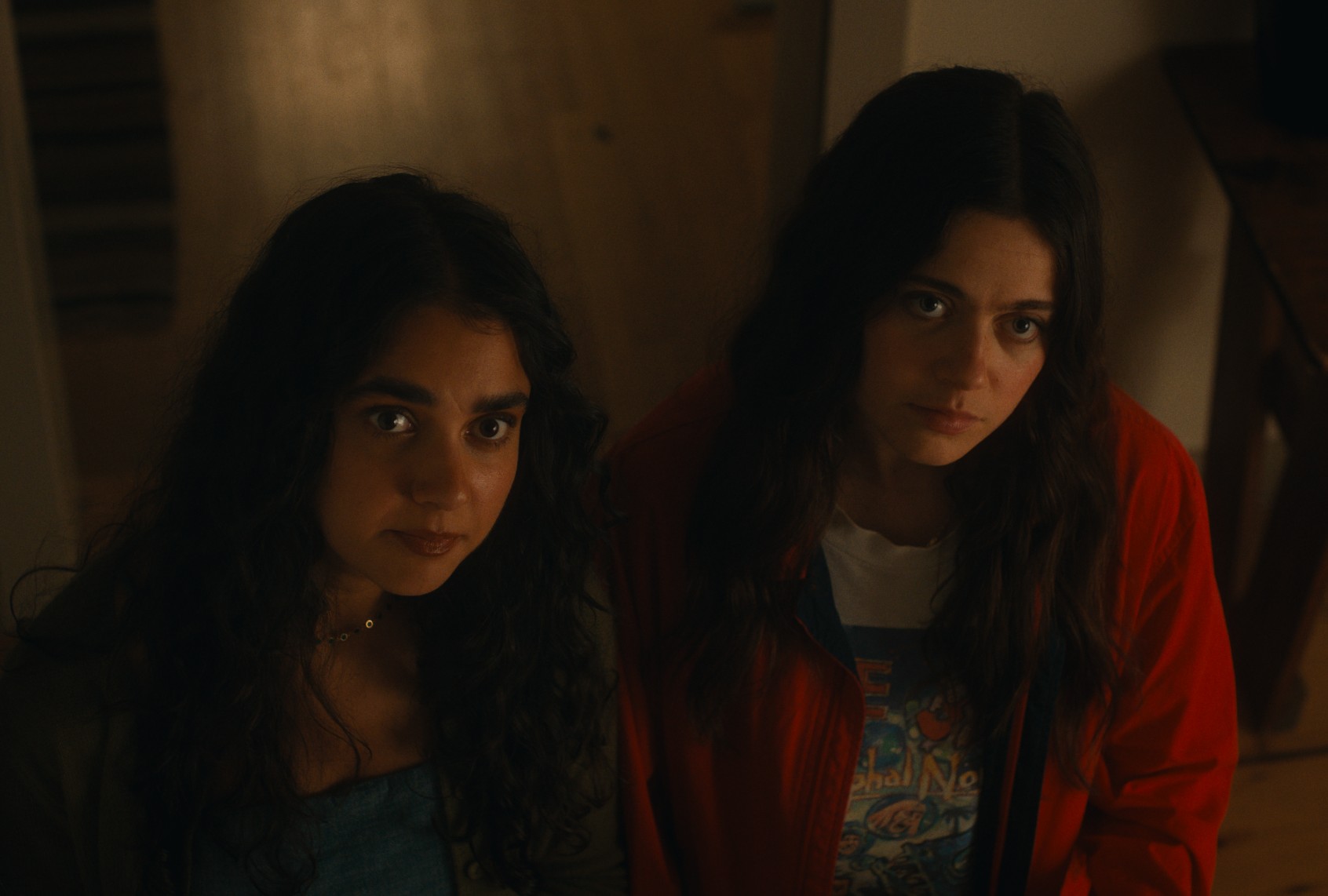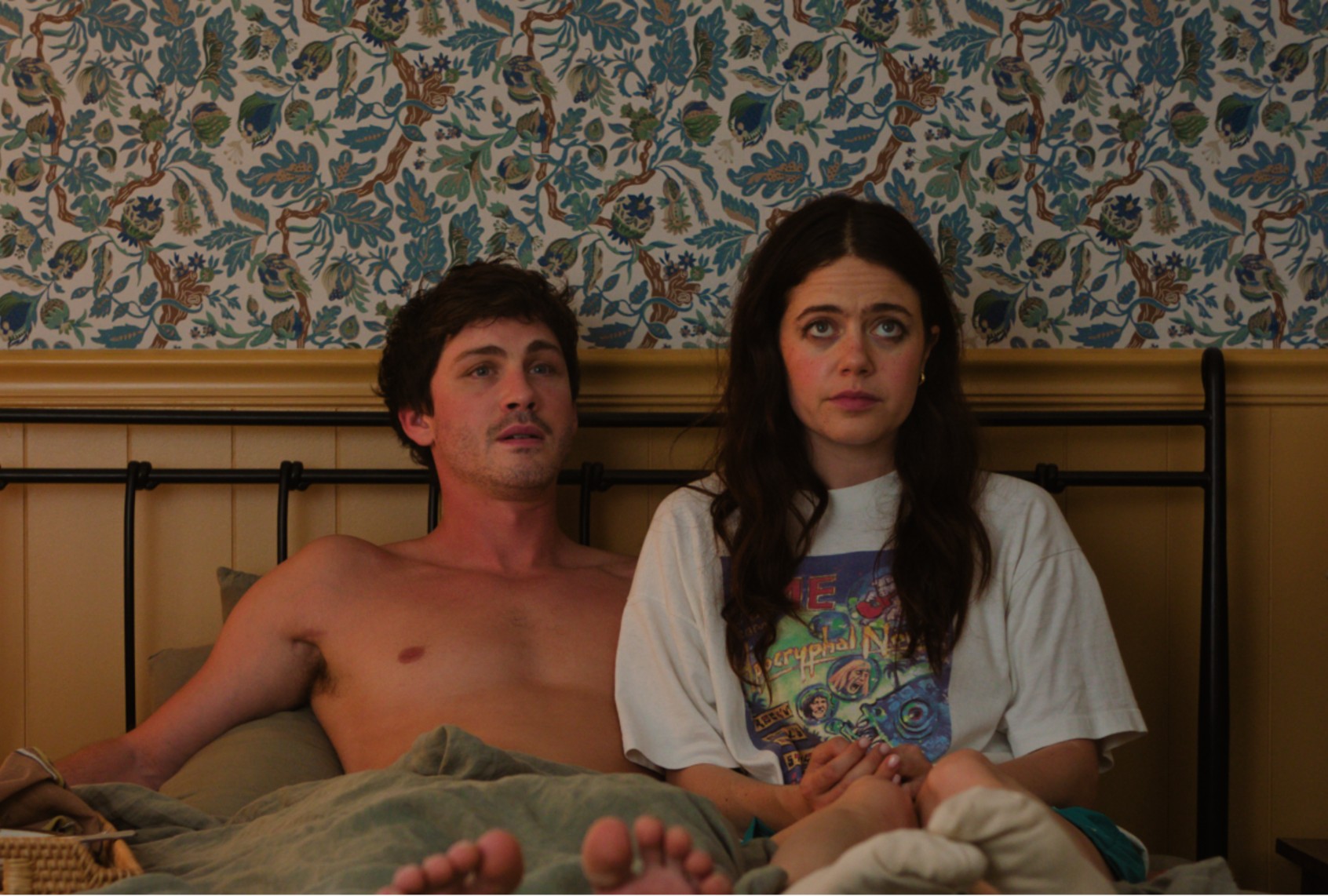For men around the world, there is no more terrifying image than the sight of Kathy Bates, standing at the foot of a bed, wielding a sledgehammer. As Annie Wilkes in the 1990 thriller “Misery,” Bates struck fear in the hearts of self-important men who fancied themselves interesting enough to be worthy of an obsession as intense as the one Bates’ character has for the prolific writer, Paul Sheldon, whom she holds captive in her remote cabin. Though “Misery” is a complex story about the toxicity that unhealthy fixations breed, and Bates won the Oscar for her intricate performance, time has reduced Annie’s image to the paragon of the “unhinged woman,” one who will turn violent if a man resists her. Tread carefully, or risk getting hobbled; you never know when a woman will show her “crazy side.”
In their new film, “Oh, Hi!,” director and writer Sophie Brooks and star Molly Gordon purposefully evoke the lasting images of “Misery”: A woman scorned, a man strapped to a bed, a remote house where no one can hear either party’s screams. On its face, the film appears to be a comedic retread of the classic thriller, finding humor in Paul’s predicament and amplifying it by portraying Annie as a fast-talking, semi-neurotic Brooklynite. That alone would be an exciting spin on an oft-told story, albeit one that still paints its woman lead as an archaically deranged stereotype. But “Oh, Hi!” is far more intelligent than a rudimentary attempt at genre-bending for a new generation. Brooks and Gordon carefully assess the sinister ways that women are depicted as crazy in media both past and present, marrying those portrayals with a brilliantly modern take on dating and relationships. The result is a hysterical, breezy dark comedy that confidently skewers viewer expectations and flips that old “Misery” script on its head, asking us to hear Annie Wilkes and her cinematic sisters out.

(Sony Pictures Classics) Logan Lerman and Molly Gordon in “Oh, Hi!”
Though the “crazy woman” trope inevitably persists in some form, it looks far more hackneyed than it did during its late-millennium heyday. Call it genius, then, that “Oh, Hi!” plays into this stereotype while simultaneously lampooning it for a push-pull dynamic that makes for one of the funniest movies of the year.
In the ’80s and ’90s, a spate of women-led, R-rated thrillers suggested to a generation of male viewers that women are more reactionary than men, more prone to acting on big feelings in violent ways, especially if spurned by a lover. The most thorny yet appropriately revered of them all remains “Fatal Attraction,” in which Glenn Close’s high-powered, blonde bombshell Alex Forrest comes undone following a weekend affair with Michael Douglas’ Dan Gallagher, who refuses to leave his wife for Alex. With her searing performance, Close (literally) demanded attention and made men think twice about letting their eyes leer across the bar. But during test screenings, Close’s nuanced portrait of a suffering woman coming undone wasn’t enough. The film’s original ending, where Alex takes her own life after accepting that she’ll never be with Dan, tested poorly with audiences, who felt it was a partial win for Alex’s character after torturing a man and his family. To the hesitation of Close and Ann Archer, who played Dan’s wife, Beth, the ending was rewritten for Alex to meet a violent, bloody, public demise. It wasn’t just that the audience wanted catharsis, it was that they wanted to see Alex — the mentally ill, lonely, mistreated woman they saw as simply “crazy” — get her comeuppance.
Part of what made “Fatal Attraction” great was its imperfection. The movie changed with time, taking on deeper meaning by igniting conversations about how women are depicted in media, and cracked open the inherently flawed “crazy woman” trope to reveal it as what it is: ableist and misogynistic. Films are fictitious, sure, but that doesn’t mean they don’t have real-life implications that may seep into our everyday lives. And though the trope inevitably persists in some form, it looks far more hackneyed and embarrassingly right-wing than it did during its late-millennium heyday.
Call it genius, then, that “Oh, Hi!” plays into this trope while simultaneously lampooning it for a push-pull dynamic that makes for one of the funniest movies of the year. Brooks and Gordon carefully tiptoe the line between stereotype and commentary, creating a tension for the audience that holds us until the film resolutely jumps toward the latter side. In the film, Gordon stars as Iris, a lovestruck twentysomething sporting rose-colored glasses over her wide-eyed gaze. Iris is taking a road trip with Isaac (Logan Lerman) to a little house they’ve rented in upstate New York, where they’ll spend the next few days swimming in the creek, drinking whiskey, having sex, eating fresh strawberries, and falling even more in love than they already are.

(Sony Pictures Classics) Geraldine Viswanathan and Molly Gordon in “Oh, Hi!”
Or, at least, that’s what Iris assumes. If not, that’s totally fine too. She’s up for anything; she’s really casual. So what if Isaac is the guy of her dreams? She’s not, like, rushing to get married or anything. As cool as Iris wants to play it, it’s hard to be anything but romantic in a setting as beautifully bucolic as the one she and Isaac have chosen. After a perfectly memorable afternoon reading outside together and swimming, followed by a night of great, kinky sex with Isaac handcuffed to the bedpost, Iris lets her guard down, confessing to him that she’s having a great time on their first trip as a couple. Except, this is all news to Isaac. Boyfriend? A couple? Still cuffed to the bed, Isaac innocently tells Iris the worst nine words a woman who is fully in love with someone she believes to be her boyfriend could possibly hear: “I’m not really looking for a relationship right now.”
The romantic atmosphere Brooks, Gordon and Lerman craft in a relatively small amount of time makes the rug-pull of Isaac’s response all the more jarring, even when the audience knows a shift is coming. Until now, we’ve seen Iris and Isaac act like two people madly in love. Gordon and Lerman’s romantic chemistry is so realistic that, if you stopped watching “Oh, Hi!” after the first 20 minutes, you’d have a moodboard of what a healthy, realistic, caring relationship should look like. Brooks cleverly builds the bones of a committed relationship that any audience member would want. And when Brooks’ screenplay takes a bazooka to that skeleton, they smartly ensure the viewer is on Iris’ side. As if it weren’t embarrassing enough to go on multiple great dates with someone and be told that they’re not looking for a relationship, it’s all-out mortifying to hear that news at the height of a romantic getaway.
Brooks and Gordon could easily get away with making “Oh, Hi!” a reverse “Misery,” with Iris as the beleaguered, sympathetic party trapped in a bad dynamic made worse by her unfeeling companion. Instead, they opt for a film that’s far more sophisticated and surprising, while still excavating truths that always existed in those “crazy woman” thrillers of yore.
Naturally, Iris spirals, becoming a caricature of herself while running through hundreds of questions in her mind. What signs did she misread? What about all of the things he said he enjoys about her? All of those aspects Isaac seemed to appreciate about Iris must now be amplified. Maybe if she can remind her boyfriend-but-not-really-her-boyfriend of how cool, funny and quirky she is, she can convince him that they are supposed to be together — that he is looking for a relationship, a relationship with her. With Isaac still bound to the bed, Iris proposes that he stay cuffed for the remainder of the day, giving her 12 hours to persuade him of their mutual destiny. The way Isaac treated their relationship status might’ve been casually cruel, but his response to Iris’ scheme is rational: He would rather not be handcuffed to a bed in the middle of nowhere with someone whom he’s only known for a few weeks.
Brooks and Gordon could easily get away with making “Oh, Hi!” a reverse “Misery,” with Iris as the beleaguered, sympathetic party trapped in a bad dynamic made worse by her unfeeling companion. Instead, they opt for a film that’s far more sophisticated and surprising, while still excavating truths that always existed in those “crazy woman” thrillers of yore. Often, the man’s callous irresponsibility would trigger a response that would snowball into something “unhinged,” intentionally augmented for dramatic effect. But Close’s Alex Forrest wasn’t wrong to enjoy her weekend with Dan in “Fatal Attraction,” or hope that more would come of it. And in “Oh, Hi!,” Brooks wryly widens the time gap between meeting and mess to force us to reassess notions about power and desire in relationships fed to the viewer by similar films.
Start your day with essential news from Salon.
Sign up for our free morning newsletter, Crash Course.
Fortunately for us, “Oh, Hi!” is as hilarious as it is thematically sharp. Gordon, having already proven her proficiency in situational comedy with films like “Theater Camp” and “Shiva Baby,” goes for broke as Iris retreats inward, desperately seeking signs she must’ve missed. “Why would you eat me out in broad daylight?” she spits at Isaac shortly after he turns the tables on their weekend. “That’s boyfriend sh*t!” And when she senses her demeanor might be putting Isaac off, she pulls back. Knowing she’s acting “crazy” is making her feel, well, crazy. While her maybe-beau stays forced in repose, Iris cycles through all the different types of women she could be. Maybe Isaac wants a homemaker? She can do that. Who doesn’t like breakfast in bed, even if they can only use one hand to eat while the other is bound? Even in her daffy moments, Iris operates like a partner who’s just trying to do something sweet for her boyfriend, pausing midway through beating an egg to wonder if he even likes French toast before remembering he ordered it that one time, a few dates back.
As matters spin out of control, and Iris calls on her friend Max (Geraldine Viswanathan) and Max’s boyfriend Kenny (John Reynolds) for help, Gordon and Brooks expertly lampoon modern dating mores that make us act as stereotypically as spurned lovers in classic thrillers. Dating apps have turned romantic opportunity into a scarcity economy, where users are made to feel like putting all of their time and effort into one person could mean they’re missing out on investing those things in someone else, someone potentially better. These apps are designed to keep us aloof, always wondering if the perfect person could be one more right-swipe away. There is a chasm between those seeking attention and those looking for love, and it’s there where Brooks and Gordon build a bridge, hoping to mend the gap separating the two. In their near-perfect exploration of how antiquated tropes have covertly transformed, bleeding into a new generation’s quest for romance, Gordon and Brooks cleverly subvert expectations at every turn. “Oh, Hi!” grabs Annie Wilkes’ sledgehammer and bashes stereotypes to pieces, letting its director and star use the broken parts to build a film that’s not only realistic, but far more thematically timeless than the predecessors it draws from.
Read more
about how media tropes have changed


